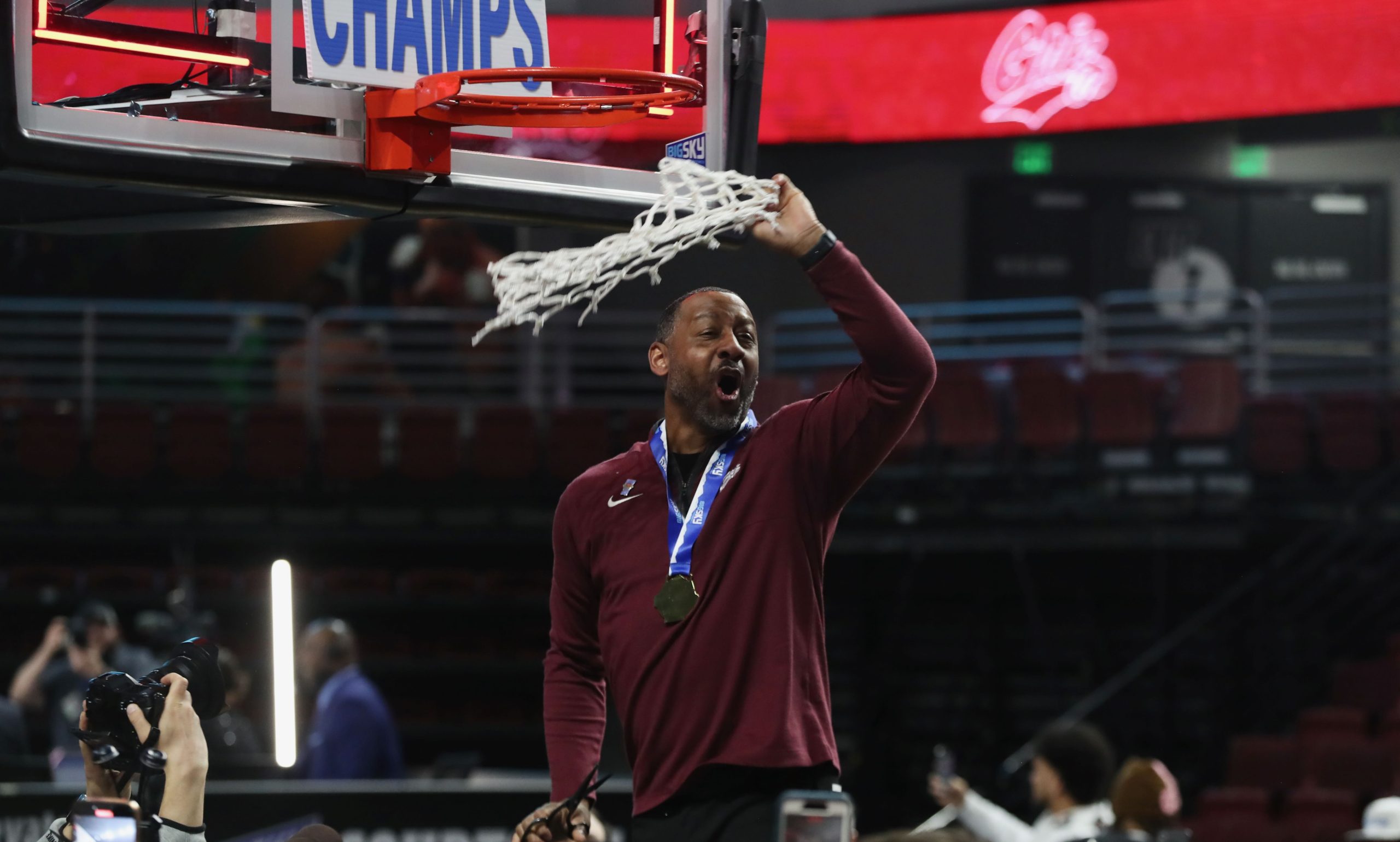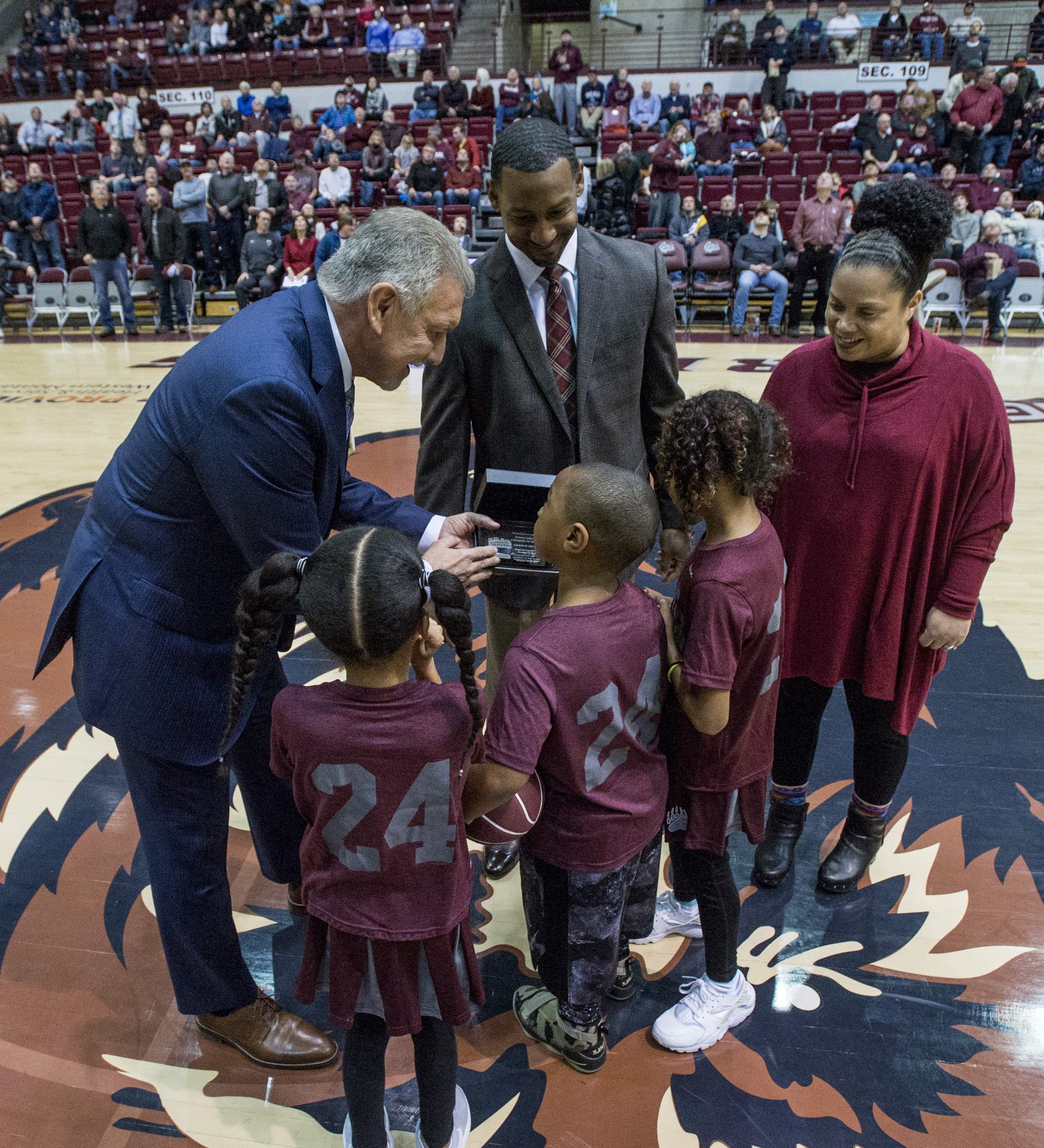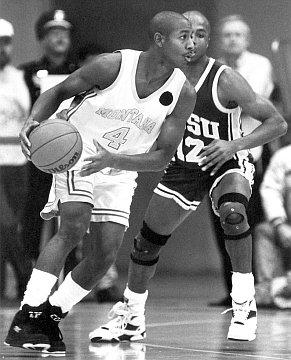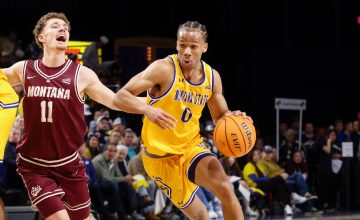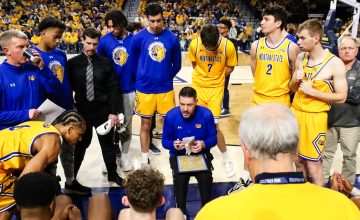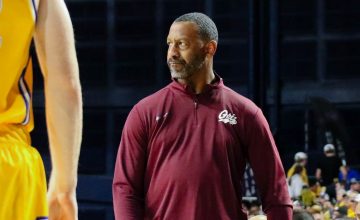Travis DeCuire is plenty used to seeing the goliaths of college basketball on the opposite bench when it comes to NCAA Tournament matchups.
During his time as a player at Montana, he saw what a Final Four team looks like up close and personal. During his time as the head men’s basketball coach at his alma mater, DeCuire has coached against a Final Four team as well.
His first exposure to what the top collegiate basketball players in the world look like up close came when DeCuire was a redshirt freshman on the 1991 University of Montana men’s basketball team.
DeCuire was sitting out that season after transferring from Chaminade (Hawaii). Kevin Kearney, Delvon Anderson and the Griz won the Big Sky Conference regular-season title that season, the first under Stew Morrill and the first since 1978 by Montana. After a pair of thrilling wins over Idaho State and Idaho in Missoula, the 23-win Griz drew a No. 16 seed in their first NCAA Tournament appearance since 1975 and just the second in school history.
Back in 1975, Jud Heathcote had led Montana to a 69-63 win over Utah State for the first NCAA Tournament win in school history. Five nights later, UM took UCLA, the juggernaut of all college basketball juggernauts, down to the wire before losing 67-64 in one of the most iconic moments in the history of the university or the Big Sky.
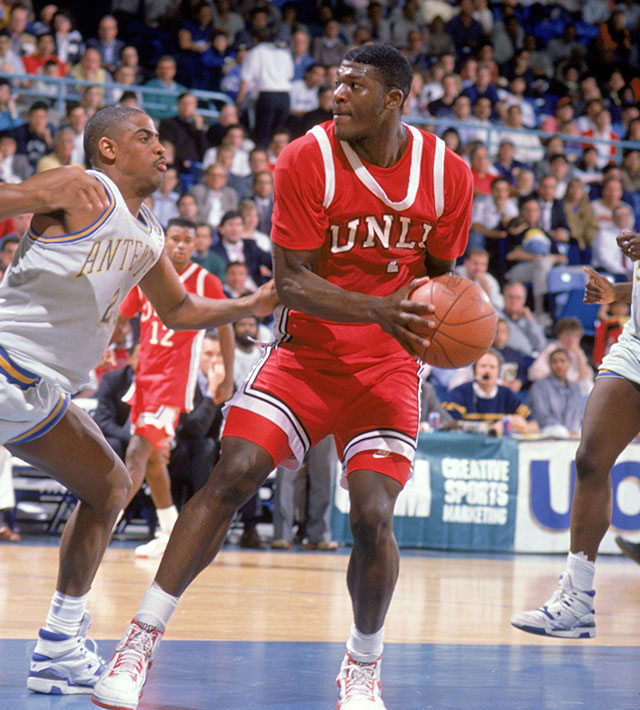
Back to 1991. The Griz were into the Big Dance after running the table in the conference tournament, an occurrence that had been elusive for Jim Brandenburgh and Mike Montgomery after they formed the first two roots of the Heathcote coaching tree that still stands strong to this day at Montana thanks to DeCuire. The reward? A matchup against No. 1 UNLV.
UNLV entered the game with a 30-0 record and riding a 41-game winning streak. Jerry Tarkanian’s Runnin’ Rebels are still remembered as one of the greatest, most fearsome and most polarizing college basketball teams of all time. But when Montana guard Eric Jordan hit UM center Darren Engellant, leading to a layup, UNLV clung to a 17-14 lead with 12 minutes to go in the first half.
“We got off to a really good start and we thought we had a chance,” said DeCuire some 35 years later. “They had t-shirts with seat belts on it that said, ‘Buckle Up.’ And at some point in time, Larry Johnson looked at us and told us to buckle up and they were a little too much for us.”
Stacey Augmon, a 6-foot-8 slasher would be the No. 9 pick in the NBA Draft later that year on the way to playing 14 seasons in the NBA, quieted the sellout crowd at the McKay Center in Tucson, Arizona, who had become enamored with a potentially historic upset bid.

The Chicago Tribune wrote: But even the most stout of anti-UNLV forces had to appreciate the spectacular play of Augmon in the first 20 minutes.
The 6-foot-8-inch forward scored 16 points on a variety of dunks and hanging, twisting layups.
The most UNLV-like bucket of the night came with 1:20 to go in the first half.
Center Elmore Spencer grabbed a defensive rebound off a missed jump shot, fired an outlet to midcourt to Anderson Hunt, who threw a lob pass toward the basket for a Larry Johnson dunk. But instead of slamming the ball threw, Johnson flipped it to Augmon, who softly reverse dunked for a 46-28 lead.
That`s unselfishness.”

Johnson, the national college player of the year that season and the No. 1 pick in the 1991 NBA Draft, poured in 23 points after winking at the Griz bench. Augmon and future NBA point guard Greg Anthony chipped in 20 points each and UNLV raced to a 99-65 win over the Griz.
“Nevada-Las Vegas is for real,” said Morrill following the loss.
”Everyone knows that, and we found it out firsthand. To experience (playing the Rebels) up close and personal was something.”
UNLV would win three more NCAA Tournament games during that run, including the following round against Alonzo Mourning’s Georgetown Hoyas. The run would come to an abrupt halt in the Final Four when Christian Laettner hit two free throws with 12 seconds left to lift Duke past UNLV.
DeCuire got a taste while watching from the bench in 1991. The following season, Montana advanced to the NCAA Tournament again, this time under Blaine Taylor, the Missoula-made fan favorite who recruited DeCuire to Missoula.
That Griz team went 27-3 in the regular-season. The win total is still UM’s single-season record, although DeCuire has been the head coach on two 26-win teams and this year’s Griz are 25-9.
In 1992, Montana avenged both its league losses (89-67 at Nevada and 73-63 at Idaho) by blasting Idaho 69-52 and outlasting the Wolfpack 73-68 to punch another ticket to the Big Dance.
Like this year’s Griz, that team received a 14-seed. And like this year’s Griz, that team got sent to a regionally friendly location. The 1992 Griz played Florida State at the Boise State Pavilion in Idaho’s capital city. This year’s Griz won the Big Sky Conference title in Boise by taking apart Northern Colorado last week and will play No. 3 Wisconsin at Ball Arena in Denver, Colorado, on Thursday.
The 1992 Grizzlies took on a Florida State team led by future NBA stars Sam Cassell, Charlie Ward and Bob Sura. Pat Kennedy was the head coach for the Seminoles, who he led to five NCAA Tournament appearances, including a run to the Elite Eight the following March. Six years after his final season at FSU and after a five-year stint at DePaul, Kennedy took over as the head coach at Montana in 2002. He was the only coach that did not come from Heathcote’s tree. He lasted two years before giving way to Larry Krystkowiak, a legendary Griz who helped refortify the foundation DeCuire’s program rests upon.
On the afternoon of March 19, 1992, Florida State’s speed and athleticism overwhelmed the Grizzlies early. The Seminoles took a 37-25 lead to halftime. In the second half, Montana came storming back, cutting the lead to six points on a thunderous one-handed dunk by Anderson off an assist in transition from DeCuire. After the assist, DeCuire pumped up a partisan crowd that was used to rooting against the Grizzlies as a Big Sky rival but who had aligned with Montana that day.
On their jerseys, the Grizzlies wore black buttons pinned in honor of legendary trainer Naseby Rhinehart, a staple of UM athletics for 47 years spent pioneering an industry as one of the first black men to hold his position in Division I athletics. A team that also featured first-team All-Big Sky selections Daren Engellant and Roger Fasting — a pair of in-state products from Geraldine and Glendive, respectively — hung with the Seminoles before eventually falling 78-68.
“I remember we should’ve won,” DeCuire said back in 2018. “I remember we went into that game hoping we could keep it close as opposed to going in expecting to win. We made two runs to get ourselves back into the game.
“If we would have had that mentality to start that game, we would’ve found ourselves down the stretch with an opportunity to win. My learning experience was that you go into every game expecting to win, playing to win rather than trying to just keep things close.”
DeCuire played 21 minutes as the first man off the bench for that Griz team. He hit a pair of 3-pointers and dished out a pair of assists. Delvon Anderson, the Big Sky Conference MVP that season, scored 18 points and grabbed eight rebounds while Roger Fasting went 7-of-11 from the floor on the way to 17 points to go with three assists. Engellant, who was a senior on that team, scored 13 points and grabbed 11 rebounds.
Despite the strong performances by those standouts, Florida State rode 23 points from future NBA star Sam Cassell and saw four others, including future NBA player Bob Sura, score 14 points en route to victory. That Florida State team went to the Sweet 16 before bowing out against Indiana in the regional semifinal.
When asked what DeCuire remembered about playing against powerhouse programs during his playing days, Montana’s 11th-year head coach said. “Runs. I remember runs. I remember the moment when we come to a timeout and everyone’s excited because we knew we belonged. I remember the moments of guys saying ‘next four minutes, next four minutes. We could, we could. We could be winners, walking away from this game if we handle these next four minutes properly.’
“So I remember being in those situations and feeling like we can make it happen. Unfortunately, that Florida State team had three NBA players on it (laughs).”
Montana’s NCAA Tournament history has featured daunting draws and chances for upsets. Heatchcote played UCLA, the eventual national champions, while Morrill played the defending national champs who made it to the Final Four.
In 1997, Taylor led UM to the Big Dance for the second and final time. The Griz played No. 1 seed Kentucky, a team that went on to the national championship game before losing to Arizona.
In 2002, Don Holst led the Griz on an unlikely run after finishing sixth in the regular-season standings to win the Big Sky title. That team faced Oregon in the first round as a 15-seed. That Ducks team went to the Elite Eight.
In 2005, Krystkowiak’s 16th-seeded Griz played No. 1 Washington and hung tough, losing 88-77 to a team that went to the Sweet 16.
In 2006, Montana got one of its only favorable draws since Heathcote was the head coach, drawing a No. 12 seed and playing Nevada. The Griz drilled their former Big Sky rival 87-79 before bowing out in the second round with a 69-56 loss to fourth-seeded Boston College.
In 2010, Wayne Tinkle’s Griz earned a 14-seed and played No. 3 New Mexico. UM fought hard before falling 62-57.
In 2012 and 2013, Montana had two of its worst NCAA losses, falling 73-49 to No. 4 seed Wisconsin, a Sweet 16 squad, in 2012. The following season, Syracuse embarrassed the Griz. The Orange’s zone defense flummoxed Montana and the underdogs lost 81-34. Syracuse went to the Final Four.
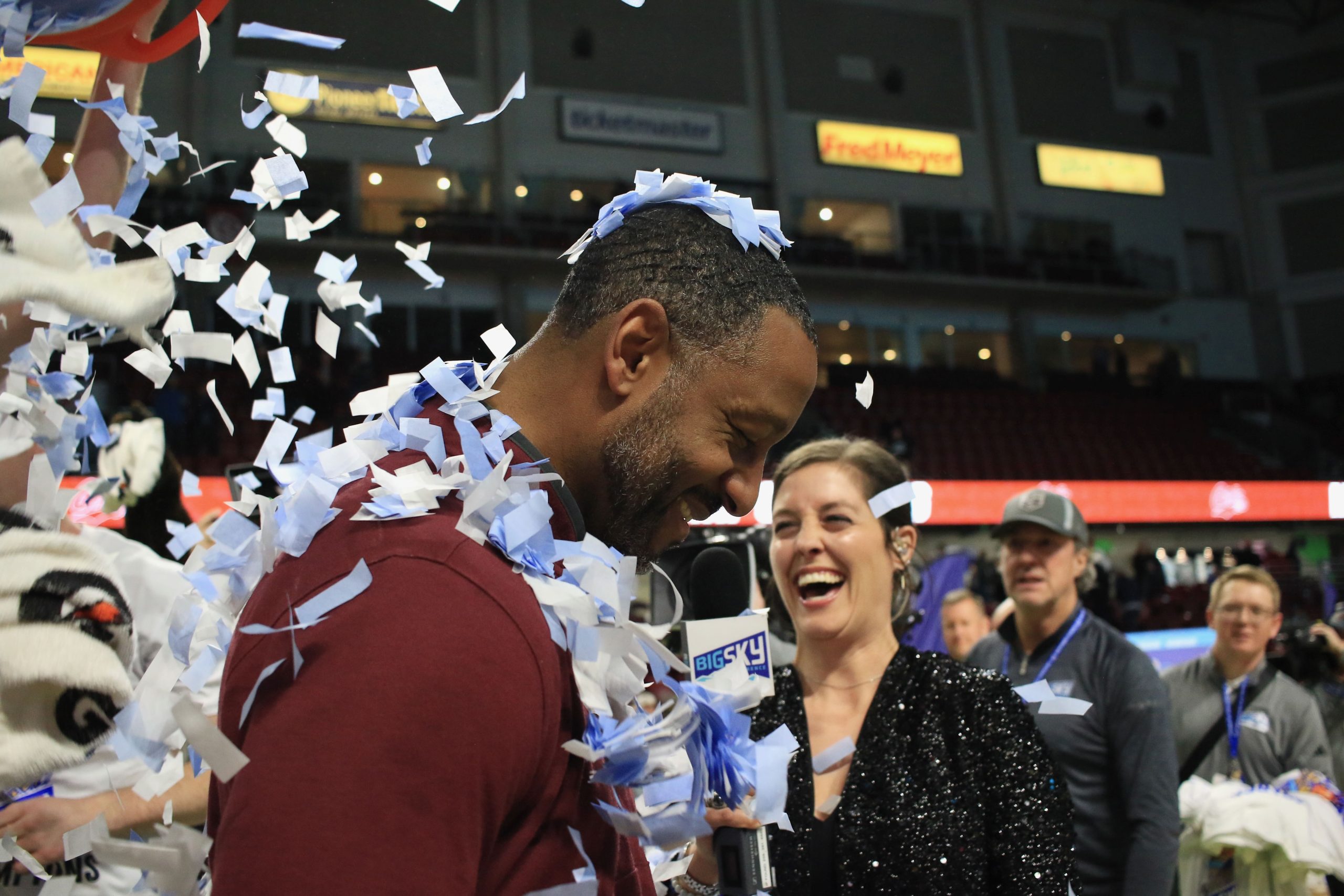
That was also the case in 2018 when the Griz played Michigan, although Montana pushed the Wolverines for much of the game in a 61-47 loss. Michigan went to the Final Four. The following year, Montana played Michigan again, losing 74-55 as the Wolverines went to the Sweet 16.
DeCuire has been a part of five of Montana’s 13 trips to the Big Dance. Thursday at 11:30 a.m. MT, his squad takes on a Wisconsin team coming off a 59-53 loss to Michigan in Sunday’s Big Ten championship game. The Badgers lost three of five down the stretch of the regular season before winning three in a row in the Big Ten tournament to surge to a No. 3 seed.
“Wisconsin is right up there with the best of them,” DeCuire said. “Michigan in 2018 was a Final Four team and we walked away from that game feeling like we had a chance. I won’t say we should’ve won. They were a Final Four team. But we had all the momentum, we had a lead and they were burning timeouts. Then the power went out. That shifted the momentum. And I don’t think it was ready to be shifted.”
DeCuire made it a focus to win the first five minutes of the game in his first trip as a head coach to the NCAA. He wanted to put Michigan on its heels and force the No. 3 seed to call timeout and reassess. Three seconds into the contest, the Wolverines turned the ball over. Less than a minute in, Montana had a 5-0 lead, and just over 4 minutes in, the lead was up to 10-0. In the first 4 minutes, 16 seconds, before the Wolverines got on the board, they were 0-for-4 shooting with three fouls and two turnovers.
Montana held the lead through the first 13-plus minutes, and even when Michigan took its first lead with 3:59 to play in the half, the Grizzlies always stayed within five points and trailed by just three at the break.
With 16:45 remaining in the second half the shot clocks lost power, resulting in an 11 minute delay in the action. The Grizzlies missed 12 consecutive shots and were held without a point for 9:56. Michigan won going away and would not lose again until the Final Four.
Even though DeCuire’s squad got a rematch the following season, he and his staff have been chomping at the bit for another chance at a Big Ten foe. That comes Thursday at 11:30 a.m. in Denver.
“You walk away from some experiences desperate for another opportunity which is what our program has right now,” DeCuire said with a smile.
